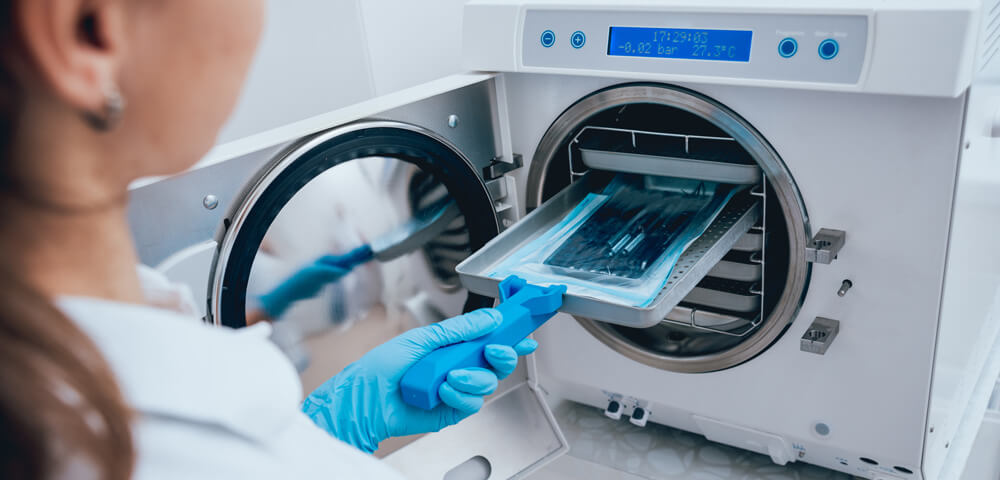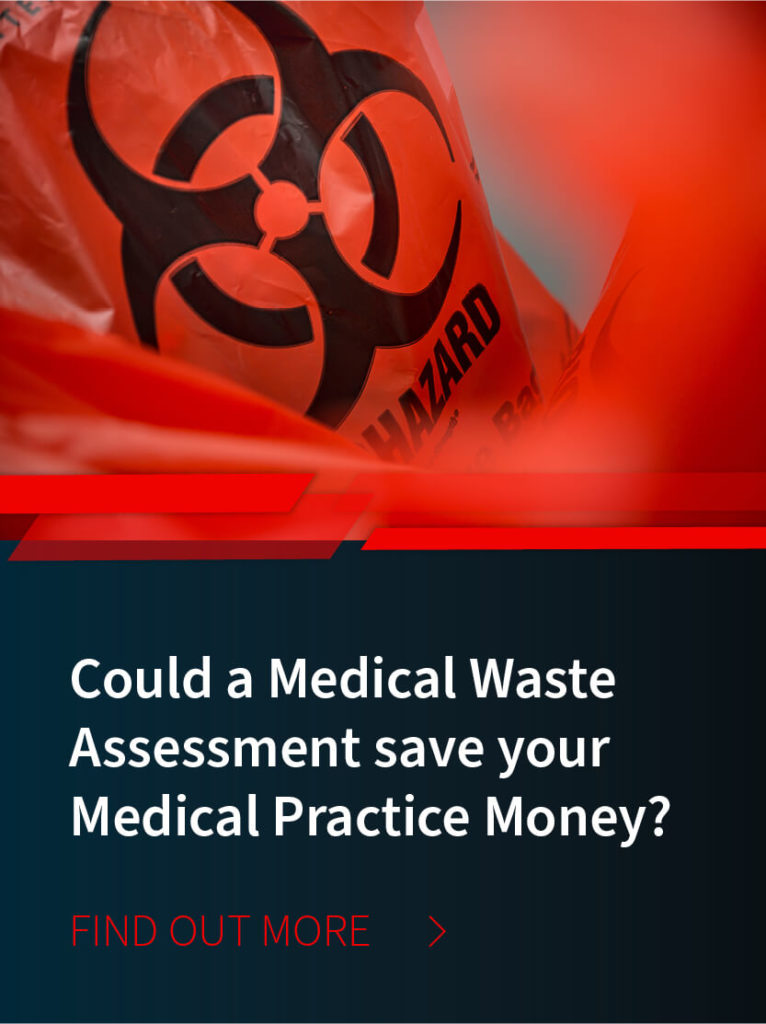
/ IN THIS BLOG
Those in the medical industry have more than likely heard of a medical waste autoclave. However, if you’re not directly involved in its use, you may not realize exactly what type/s of medical waste can be disposed of in an autoclave and what can’t. In fact, knowing about this process of medical waste disposal is essential in order to maintain compliance with local, state, and federal laws regarding medical waste management.
01 / What Is a Medical Waste Autoclave?
An autoclaving machine is a device often utilized in healthcare facilities to sterilize or treat regulated medical waste via highly heated steam. Medical autoclaves come in a variety of sizes and types. Primary types of autoclaves are capable of creating pressurized steam that rises up to 300° F to achieve sterilization.
Autoclaves are categorized by type: size, capacity, and function. In the medical industry, they are also defined by class, such as:
Class B – can sterilize a broad range of regulated medical wastes
Class N – primarily designed to treat simple loads such as flat medical tools
Class S – Creates a dense steam that is effective for treatment of bagged or porous loads but can also sterilize tools
In order to properly and safely inactivate potentially hazardous or infectious materials from medical tools or prior to disposal of some types of medical waste, certain temperatures of steam must be obtained for certain amounts of time.
For example, according to the Environmental Protection Agency (EPA) a liquid ‘kill’ cycle must run for 180 minutes in order to sterilize biohazardous waste. Other types of waste might require lower temperatures to ensure sterilization. The standard temperature range for an autoclave is 250°F to 270°F (121°C to 132°C). Always refer to manufacturer guidelines for temperature range to ensure that any viral, biological, or bacteria on the items is rendered inactivated.
The time the autoclave must run also differs depending on type and size. Minimum sterilizing time for a gravity-type autoclave reaching the required 250°F temperature is 15 minutes, while at higher temperatures, minimum sterilization may be achieved in as little as four minutes. Timing will also depend on how items are wrapped (or not) when placed in the autoclave.
Certain operating standards regarding autoclaves vary from state to state. For example, some states require the sterilized waste to also be shredded before disposal in a landfill. Other states do not require this extra step, such as Georgia.
The amount of time the biohazardous waste needs to be in the actual machine also varies from state to state. Some states are stricter about timing than others in their regulations. In fact, many state regulations are more stringent than those of the federal government.
02 / What Types of Waste Can undergo the Autoclave Process?
Medical waste autoclaves are used specifically for regulated medical waste, which involves anything even potentially contaminated by blood, bodily fluids, or other potentially infectious materials. Such materials include but are not limited to:
Used medical sharps such as needles and syringes, scalpels, other sharp tools or instruments, as well as sharps containers
Bloody bandages or gauze or other ‘red bagged’ waste
Masks or gowns (worn by doctors or patients)
Such regulated waste is sometimes referred to by several other names, including red bag waste and biohazardous material. These multiple names can cause confusion, but it's important to remember these are just different names for the same type of waste – meaning anything that has been contaminated with blood or blood components or body fluids. Keep in mind that an item saturated with urine, vomit, or feces is not regulated waste unless it has been contaminated with blood or other potentially infectious materials (OPIM).
03 / What Types of Wastes Can't Go through Autoclave Machines?
Nothing that has potentially been contaminated with a hazardous waste should go into an autoclave. Such wastes can include but are not limited to trace chemotherapy waste, pathological wastes, or plastics like IV tubing or needles that have been used in chemotherapy treatments.
Even under the umbrella of regulated medical waste, not everything is disposed of through the autoclaving process. Two major exceptions are the above-mentioned chemotherapy waste and pathological waste. Anything potentially hazardous in nature must be incinerated. As such, they should be properly packaged and shipped off-site for incineration and then compliantly disposed of.
Regulated waste transported off-site should be accompanied by a Bill of Lading. Any hazardous waste shipped off-site requires a Hazardous Waste Manifest. An incinerator burns the waste rather than steaming and sterilizing it.
If chemotherapy waste or pathological waste was merely sterilized in an autoclave, it would still be hazardous and unsafe for landfill disposal. Incineration ensures these kinds of waste no longer pose any health risks to people, animals, or the environment. Because this process is more extensive and involved, it is more costly than autoclaving.
04 / Proper Regulated Medical Waste Disposal
Proper and compliant regulated medical waste disposal is not only vital for safety, but to reduce the risk of massive fines and penalties for improper waste disposal processes involving both regulated medical waste and other types of waste, such as hazardous waste disposal practices.
It's imperative to know and follow the disposal rules for bio-hazardous materials because the waste generator (you and your facility) is the sole entity responsible for maintaining compliance. So, from the moment that waste is generated from the moment it is finally disposed on in a landfill or destroyed, YOU are the responsible party. It’s called the Cradle-to-Grave approach.
Know the rules. Follow the rules. If in doubt, don’t guess but turn to a knowledgeable and reliable company like MCF Environmental Services, with over three decades of experience in medical and hazardous waste management.
If you're at all unsure about your waste and what proper disposal method you should use, call MCF Environmental Services to discuss medical waste regulations or medical waste autoclaves in general. We are an Atlanta-based waste management company serving states throughout the country.
Robert Losurdo
President, COO








